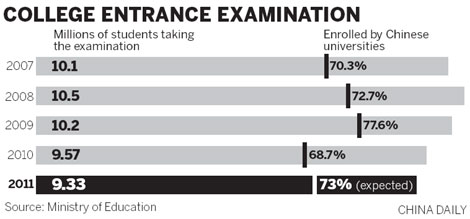Society
Fewer students taking annual national entrance test
(China Daily)
Updated: 2011-06-08 07:43
 |
Large Medium Small |
Beijing - At one time it was hard for Chinese universities to foresee a day when they would have to struggle to continue their existences.
A fast rise in enrollment numbers and the intense competition seen every year among the millions of students who wanted to secure an admission to college had made the past decade a "golden era" for such institutions.

But the day of reckoning seems to have arrived.
This year, about 9.33 million students have registered to go to testing sites throughout the country on Tuesday and Wednesday and take the national exams they must pass to gain entrance to college.
That is 240,000 fewer than were registered for the exams last year. The number has fallen three years in a row since 2008, when 10.5 million people were registered for the exams.
Ma Yan, a senior consultant for MyCos, a Beijing-based higher education consulting firm, said "the decline results from the fact that there are now fewer high school students, which is a result of the decreased birth rate caused by China's family planning policy."
"The downward trend in enrollment may last until 2018," Ma added.
National census figures show that 13.79 million babies were born in 2000, about 10 million fewer than in 1990, according to official records.
About 73 percent of the applicants this year will be accepted to the college of their choice, an increase of 4 percentage points from last year.
"As the suppliers of higher education, colleges used to have much greater opportunities to pick among students," Ma said. "But students have more choices now, and the competition among them is no longer so great."
Another reason fewer people have been registered for the test is that more students are choosing to study overseas. According to statistics from the Ministry of Education, about 200,000 high school students are studying abroad and, as a result, will not take the exam.
He Yizheng, a student at Dongbei Yucai Middle School in Shenyang, capital of Northeast China's Liaoning province, is practicing English and tennis.
"I received an offer from the University of Pennsylvania in the United States," he said.
"Compared with Chinese universities, foreign schools attach greater importance to the improvement of students' general competence."
A report released earlier this year by China Education Online, an Internet-based educational resource operated by the Ministry of Education, predicted that universities will struggle with money troubles during the next 10 years as they continue to enroll fewer students.
Smaller student bodies will force many institutions of higher education to make do with less revenue, especially those that are not well-known or are private, the report said.
Forty-five students at the South University of Science and Technology of China, the first university in the country to recruit students independently of the government, did not take the college entrance exam either.
The university began its first semester in March after choosing 45 freshmen from a pool of 745 applicants.
Xinhua
| 分享按钮 |